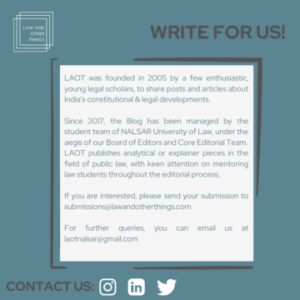Call For Blogs: CCR Law Review Blog
About Our Center:
The Center for Child Rights, in collaboration with UNICEF, operates as a distinguished ‘Center of Learning’ at the National University of Study and Research in Law, Ranchi. Our vision, in alignment with UNICEF, is to establish the Center as a Center of Excellence for child protection and child rights. Our initiatives encompass various activities, including seminars, trainings, and workshops. We are dedicated to developing expertise in the field and acting as a repository of knowledge related to laws concerning children and their implementation.
Sub-Themes for Blog Submissions:
1. Child Pornography: Legal Implications and Safeguards
2. Digital Rape: A Critical Examination within Legal Frameworks
3. Child as a Ground for Divorce in Matrimonial Disputes: A Comprehensive Legal Analysis
4. Children as Parents’ Property: Legal Perspectives and Contemporary Discourse
5. Corporal Punishment for Children: Legal Aspects and Ethical Concerns
6. Rights of Queer Children: A Jurisprudential Exploration
7. Implementation & Infringement of the Right to Education: A Reality Check
8. Child Beggary: A Socio-Legal Perspective
9. Aaganwadis as Constitutional Obligation: Evaluating Legal Frameworks
10. Child Rights Gram Sabhas: A Status Report on Implementation and Challenges
11. Fee Defaulters and Right to Education: The Imperative for Stringent Legislation
12. Legality of Employing Children Below 14 years as Priests in Temples & Govindas during Festivals: Legal Scrutiny and Societal Impact
Note: The sub-themes are merely suggestive, and the authors are free to choose areas of their interest within the broader realm of child rights. Any interdisciplinary study of child rights and child protection is also encouraged.
Submission Guidelines:
- We welcome blog posts that address contemporary issues on Juvenile Justice Law and other related laws.
- Submissions may take the form of articles, opinions, case comments, and short notes. Furthermore, submissions analyzing or critiquing existing academic research on a topic or issue are also welcome.
- The article should be an original work of the author and not under consideration for publication in any other journal or blog. The work should not be plagiarized beyond 15%.
- AI-generated content will be summarily rejected.
- Submissions should range from 1000-2500 words.
- Co-authorship of a maximum of 2 is permitted.
- The content must be in Times New Roman, font size 12, with a line spacing of 1.5.
- Submissions shall contain hyperlinks in the body of the manuscript itself, instead of footnotes and endnotes. However, citations that cannot be hyperlinked should be added as end notes. Citation format should be Bluebook 20th Edition.
- Authors are encouraged to provide their LinkedIn handles for acknowledging their work on social media platforms and tagging them.
- Submissions may take the form of articles, opinions, case comments, and short notes. Furthermore, submissions analyzing or critiquing existing academic research on a topic or issue are also welcome.
Submission Process:
Submissions are accepted on a rolling basis. Please submit your blogs via the provided Google Form. The review process typically takes 3-4 weeks for communicating the acceptance or rejection to the authors.




